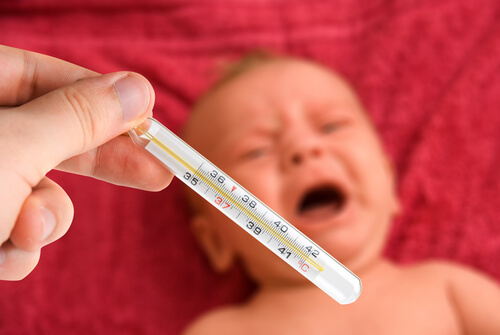Caring for a Premature Baby at Home

Taking appropriate care of a premature baby is essential to their health and well-being.
Contrary to what you may believe, it isn’t too difficult. You just have to be cautious and use common sense when taking care of your baby.
There are many amazing stories of premature babies who have recovered miraculously. These stories have shown the world that love is the best ingredient to take care of a child that was born prematurely.
Although taking care of a baby at home can be nerve-racking, trust in yourself and you’ll see that you’ll both be fine.
Keep the following in mind: a premature baby is only discharged from the hospital when they’ve already almost fully recovered. Therefore, you’re completely apt to give them the care they need to develop at home.
Doctors usually discharge premature babies after they reach 37 to 40 weeks of gestational age.
At this age, the baby who was born prematurely is already able to regulate their body temperature and therefore they don’t have to be kept in an incubator. They’ll also eat by themselves and will weigh around 2 kilograms.
Although a mother’s love is her baby’s best ally, there are some guidelines and medical follow-ups that must be followed during the baby’s first year of life.
This is done in order to ensure they’re developing in a healthy manner.

Measures at home
There are a series of general measures – especially hygiene – that should be taken into account when taking care of newborns. This is especially important with premature babies because their health is more fragile during their first year of life.
The first measure is keeping clean. It’s important for everyone who wants to touch the baby to wash their hands before touching the child.
This is especially important when the people are coming from outside where viruses and bacteria could be spreading.
Another measure to be taken is to not allow anyone to smoke near the child. They should live in a smoke-free environment.
In their first year, the baby should also avoid contact with sick people or toys and other objects that may be contaminated.
Parents should also avoid having the baby be in closed spaces. Spaces such as supermarkets or daycare centers should be avoided.
Monitor the temperature in the environment in which the baby is in. The ideal temperature is around 22ºC. If the temperature is below 22ºC the baby may have to use up a lot of energy to stay warm.

Placing the baby on their back when they’re going to sleep is another important measure. Newborn babies sleep for between 16 to 18 hours a day and premature babies may even sleep for longer.
When the baby is going to sleep, place them on their back. Make sure there are no toys or foreign objects inside the crib.
What does a premature baby need?
Although it’s good to adopt certain sanitary measures and precautions for your child’s health, it’s also good to move around with the child.
Try to take them out for walks in the open air. Be sure to keep them away from closed and crowded spaces where they could get infected by a virus.
Your baby’s nervous system needs to be stimulated. In order to do this, talk to the child, carry them in your arms, play with them, show them bright colors for them to look at.
Always have your pediatrician’s number on hand. They’ll be able to answer any questions you may have about breathing difficulties, bluish skin changes, fever or hypothermia.
Be attentive to their behavior. Consult your pediatrician if your baby cries for no apparent reason.
You should also get in touch with your specialist if the child doesn’t want to eat and if they don’t follow objects visually.
Keep in mind that premature babies need medical follow-ups.
In addition to the measures mentioned above, it’s also important to take the baby to the doctor for checkups periodically. Doctors will check for the following:
- Their sense of sight and hearing.
- Their central nervous system (which can be assessed through smile responses, senses and other reflexes).
If they present any learning difficulties, hyperactivity disorders, attention deficit or language difficulties, the issues should be followed up by a neuro-pediatrician and early care centers.
Taking appropriate care of a premature baby is essential to their health and well-being.
Contrary to what you may believe, it isn’t too difficult. You just have to be cautious and use common sense when taking care of your baby.
There are many amazing stories of premature babies who have recovered miraculously. These stories have shown the world that love is the best ingredient to take care of a child that was born prematurely.
Although taking care of a baby at home can be nerve-racking, trust in yourself and you’ll see that you’ll both be fine.
Keep the following in mind: a premature baby is only discharged from the hospital when they’ve already almost fully recovered. Therefore, you’re completely apt to give them the care they need to develop at home.
Doctors usually discharge premature babies after they reach 37 to 40 weeks of gestational age.
At this age, the baby who was born prematurely is already able to regulate their body temperature and therefore they don’t have to be kept in an incubator. They’ll also eat by themselves and will weigh around 2 kilograms.
Although a mother’s love is her baby’s best ally, there are some guidelines and medical follow-ups that must be followed during the baby’s first year of life.
This is done in order to ensure they’re developing in a healthy manner.

Measures at home
There are a series of general measures – especially hygiene – that should be taken into account when taking care of newborns. This is especially important with premature babies because their health is more fragile during their first year of life.
The first measure is keeping clean. It’s important for everyone who wants to touch the baby to wash their hands before touching the child.
This is especially important when the people are coming from outside where viruses and bacteria could be spreading.
Another measure to be taken is to not allow anyone to smoke near the child. They should live in a smoke-free environment.
In their first year, the baby should also avoid contact with sick people or toys and other objects that may be contaminated.
Parents should also avoid having the baby be in closed spaces. Spaces such as supermarkets or daycare centers should be avoided.
Monitor the temperature in the environment in which the baby is in. The ideal temperature is around 22ºC. If the temperature is below 22ºC the baby may have to use up a lot of energy to stay warm.

Placing the baby on their back when they’re going to sleep is another important measure. Newborn babies sleep for between 16 to 18 hours a day and premature babies may even sleep for longer.
When the baby is going to sleep, place them on their back. Make sure there are no toys or foreign objects inside the crib.
What does a premature baby need?
Although it’s good to adopt certain sanitary measures and precautions for your child’s health, it’s also good to move around with the child.
Try to take them out for walks in the open air. Be sure to keep them away from closed and crowded spaces where they could get infected by a virus.
Your baby’s nervous system needs to be stimulated. In order to do this, talk to the child, carry them in your arms, play with them, show them bright colors for them to look at.
Always have your pediatrician’s number on hand. They’ll be able to answer any questions you may have about breathing difficulties, bluish skin changes, fever or hypothermia.
Be attentive to their behavior. Consult your pediatrician if your baby cries for no apparent reason.
You should also get in touch with your specialist if the child doesn’t want to eat and if they don’t follow objects visually.
Keep in mind that premature babies need medical follow-ups.
In addition to the measures mentioned above, it’s also important to take the baby to the doctor for checkups periodically. Doctors will check for the following:
- Their sense of sight and hearing.
- Their central nervous system (which can be assessed through smile responses, senses and other reflexes).
If they present any learning difficulties, hyperactivity disorders, attention deficit or language difficulties, the issues should be followed up by a neuro-pediatrician and early care centers.
This text is provided for informational purposes only and does not replace consultation with a professional. If in doubt, consult your specialist.








